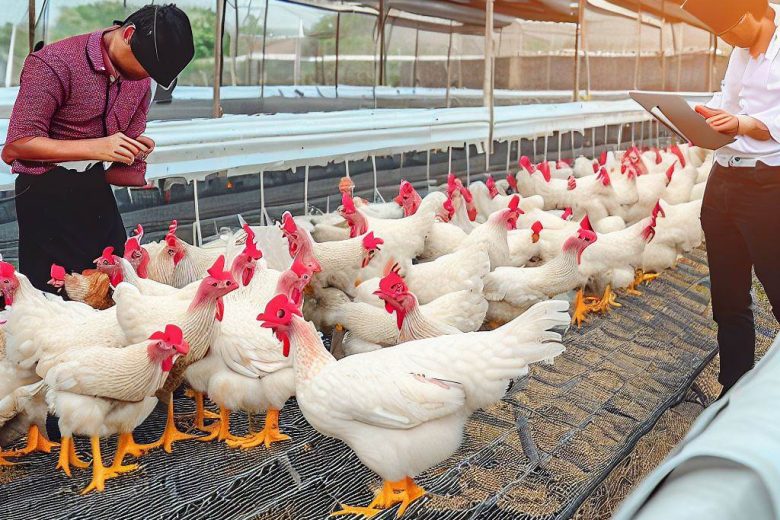If you have ever dreamed of running your own business in the agricultural sector, starting a poultry farming venture in Indiana might be the perfect opportunity for you.
Poultry farming entails the raising of domestic birds for meat and egg production, and it is a rapidly expanding sector within the agriculture and farming industry.
The steps required to start poultry farming business in Indiana include choosing an ideal location, obtaining required license, select poultry niche, acquire poultry housing, equipment, and breed, among others.
In this guide, we will explore the essential steps, best practices, and key considerations to help you successfully launch and manage your poultry farming business in Indiana.
How to Start a Poultry Farming Business in Indiana
With the growing appetite for poultry products, establishing a poultry farming business offers significant profit potential.
Poultry farming involves commercially raising domestic birds for meat, eggs, and feathers. However, despite its allure, many ventures fail due to inadequate knowledge and business skills.
We have compiled the essential steps and provide valuable insights to help you navigate the challenges and build a successful poultry farming enterprise.
Follow the steps below to start a poultry farming business in Indiana.
Step 1: Choose the Ideal Location
Selecting the right location for your poultry farming business in Indiana is vital.
Ensure that your poultry houses are situated away from residential and industrial areas. Access to proper road facilities is essential.
Make sure there are basic amenities such as water and electricity available. Consider the availability of farm labor at affordable wages.
Select a high area where water does not accumulate, and prioritize proper ventilation in the poultry house.
These factors contribute to a conducive environment for healthy bird growth and efficient operations.
Step 2: Get Required License
Before launching your poultry farming business in Indiana, ensure that you obtain the necessary licenses.
Contact the local agricultural authorities or the Department of Agriculture to understand the specific permits and licenses required.
These may include permits for operating a poultry farm, handling and selling poultry products, and adhering to health and safety regulations.
Acquiring the required licenses demonstrates your commitment to operating a legal and compliant business.
Take the time to complete the necessary paperwork and fulfill any additional requirements to ensure a smooth and hassle-free start to your poultry farming venture.
Step 3: Select your Poultry Niche
In the vast world of poultry farming, it’s important to choose your niche. There are two primary types: broilers, raised for meat, and layers, raised for eggs. You can decide to work in all fields or focus on one or two areas initially.
The options include meat production (broiler breeding), egg production (layered breeding), poultry feed production, chicken breeding (hatchery), and egg/meat processing. However, before diving in, consider sales assurance.
For instance, if you opt for the broiler business, assess the associated risks. Contact local broiler companies to gauge their interest in purchasing your products.
This will help you make an informed decision about which niche to pursue for your poultry farming venture.
Step 4: Acquire Poultry Housing
When starting your poultry farming business in Indiana, securing appropriate poultry housing is crucial. Consider the following options based on your chosen niche:
#1. Traditional Housing Systems
Commonly used, these consist of solid metal or mesh cages with loose floors, accommodating 3 to 8 birds.
Water is supplied overhead, while feed is provided through a trough at the front of the cage. You can decorate or utilize floor space based on availability.
#2. Broiler Production Systems
Ideal for meat birds, these systems prioritize adequate food supply for growth. Single-layer cages have egg collection holes.
Parent cages allow mating, while minimizing egg breakage. Rearing cages facilitate chicken growth.
#3. Backyard Chicken Coops
For those raising chickens on a smaller scale, numerous options are available. Consider predator protection as a primary concern.
Evaluate the pros and cons of each housing system, considering factors such as space, maintenance, and suitability for your poultry farming goals.
Ensure that the chosen housing option provides a comfortable and secure environment for the birds’ well-being.
Step 5: Acquire Poultry Equipment
As you progress with your poultry farming business in Indiana, obtaining the necessary equipment is essential for efficient operations.
Consider the following equipment for your poultry farm:
- Feeders and Waterers: Invest in durable and easy-to-clean feeders and waterers to ensure a steady supply of food and water for your birds.
- Incubators: If you plan on hatching your own chicks, acquire reliable incubators that provide optimal temperature and humidity control.
- Heat Lamps or Brooders: For young chicks, provide a warm environment using heat lamps or brooders to maintain the right temperature until they grow feathers.
- Egg Collection Equipment: If you’re involved in egg production, obtain egg collection trays or conveyor belts to facilitate easy and efficient egg gathering.
- Ventilation Systems: Install proper ventilation systems in your poultry housing to maintain air circulation and minimize the risk of respiratory issues among the birds.
- Cleaning and Disinfecting Tools: Ensure you have the necessary tools like brushes, brooms, and disinfectants to maintain a clean and hygienic poultry environment.
Investing in quality poultry equipment enhances productivity and contributes to the well-being of your birds.
Choose equipment that aligns with the scale and specific requirements of your poultry farming business.
Step 6: Acquire and Stocking Poultry Breeds
As you advance in starting your poultry farming business in Indiana, acquiring and stocking the right poultry breeds is crucial.
Consider the following common layer and broiler breeds raised in the region:
#1. Layer Breeds:
- Rhode Island Red: Known for their excellent egg-laying capabilities and hardiness.
- Leghorn: Recognized for their high egg production and efficient feed conversion.
- Sussex: A dual-purpose breed that lays a respectable number of eggs while also providing quality meat.
#2. Broiler Breeds:
- Cornish Cross: Widely favored for its rapid growth and high meat yield.
- White Plymouth Rock: Known for its good feed conversion ratio and tender meat.
- Jersey Giant: A larger breed that takes slightly longer to reach market weight but offers substantial meat yield.
When acquiring poultry breeds, prioritize sourcing from reputable breeders or hatcheries. Select birds that exhibit good health, vigor, and conformity to breed standards.
Ensure that you have adequate space, suitable housing, and proper nutrition to support the growth and well-being of the chosen poultry breeds.
Step 7: Poultry Farm Management
To run a successful poultry farming business in Indiana, effective farm management is crucial. Pay attention to the following aspects:
Hygiene
Maintain a clean and sanitary environment in your poultry farm to prevent the spread of diseases. Regularly clean the poultry housing, equipment, and waterers. Try and establish measures to minimally reduce the risk of disease introduction.
Feeding
Provide a well-balanced and nutritious diet to your poultry birds. Consult with a poultry nutritionist to formulate appropriate feed rations for each growth stage. Ensure a constant supply of fresh and clean water for hydration.
Poultry Bird Treatment
Regularly monitor the health of your poultry birds and appropriately address any signs of illness or injury. Establish a relationship with a veterinarian specializing in poultry to seek professional guidance and treatment when needed.
Step 8: Sales of Poultry Produce
As your poultry business in Indiana grows, establish effective sales channels. Identify potential customers like grocery stores, restaurants, farmers’ markets, or direct sales.
Build relationships by showcasing quality, offering samples, and participating in local events.
Determine competitive pricing based on costs, demand, and competition. Market your products through websites, social media, flyers, and attend trade shows.
Package products attractively, comply with labeling regulations, and develop a reliable distribution system through partnerships or your own network.
Essential Tools and Inputs
Equipping your poultry farm with the necessary tools and resources enhances operational efficiency. Some of the equipment needed for poultry farming business include:
- Incubators
- Brooders
- Chicken Cages
- Transport Crates
- Feeders and Drinkers
- Vaccination Equipment
- Debeaking Machine
- Egg Crates
Proper Spacing for Poultry Birds
Determining the right stocking density within your poultry houses is crucial for ensuring the well-being and productivity of your birds.
Proper spacing minimizes stress and reduces the risk of disease outbreaks, resulting in healthier flocks and better yields.
Yield of Poultry Birds per Acre
Estimating the yield of poultry birds per acre requires careful consideration of factors such as breed, feeding practices, and environmental conditions.
Understanding these variables can help you set realistic production goals and monitor your farm’s performance effectively.
Top Supplier of Day-Old Poultry Birds
Choosing a reliable supplier for day-old chicks is essential for starting your poultry farm. Researching and identifying reputable sources can guarantee healthy and genetically sound birds for your operation.
Some of the top supplier of day old poultry birds in Indiana include:
- Hidden Creek Farm
- AK Countryside Farm
- Big Pine Hatchery
- Midwest Poultry Service
- Maria’s Jersey Giants
Costs and Financial Considerations
Starting a poultry farming business entails various costs, including infrastructure setup, feed procurement, healthcare, and labor.
Calculating these expenses and creating a comprehensive budget ensures financial preparedness for your venture.
Potential Returns on Poultry Farming
Evaluating the potential returns on your investment involves assessing factors such as market demand, production efficiency, and pricing strategies.
This analysis will give you insights into the profitability of poultry farming in Indiana.
Assessing Risk in Poultry Farming
Poultry farming, like any business, carries inherent risks. Understanding challenges such as disease outbreaks, market fluctuations, and regulatory changes enables you to implement effective risk management strategies.
Profitability of Poultry Farming
Is poultry farming truly profitable? This section delves into the financial aspects, taking into account potential revenue streams, operational costs, and long-term sustainability.
Benefits of Poultry Farming
Exploring the benefits of entering the poultry farming industry highlights its potential for financial stability, job creation, and contributing to food security. From small-scale to large-scale operations, poultry farming offers numerous advantages.
Starting a Small-Scale Poultry Farm
For those interested in a backyard or small-scale poultry farm, this section provides practical insights into space utilization, breed selection, and maintaining a manageable flock size.
Starting a Commercial Poultry Farm
Scaling up to a commercial poultry farm involves strategic planning, larger infrastructure, and managing a higher number of birds. Learn how to navigate the complexities of large-scale operations.
Common Challenges in Poultry Farming
No business is without its challenges. Discussing common issues such as disease outbreaks, market unpredictability, and regulatory compliance prepares aspiring poultry farmers to overcome hurdles.
Tips for Success in Poultry Farming
To thrive in the poultry farming industry, implement strategies that encompass efficient management, disease prevention, proper nutrition, and effective marketing. These tips set the stage for success.
Ideal Areas for Poultry Farming
Choosing the right location within Indiana significantly impacts the success of your poultry farm.
Factors like climate, infrastructure, and access to markets play a vital role in determining the ideal areas for poultry farming.
Poultry Product Buyers and Industries
Identifying potential buyers and industries for your poultry products is crucial for establishing a reliable market.
Building relationships with processors, retailers, and consumers ensures a steady flow of income.
Optimizing Poultry Production
Maximizing poultry yield and efficiency requires employing advanced farming practices, innovative technologies, and sustainable management approaches. Learn how to optimize production for better results.
Managing Poultry Health and Pests
Disease prevention and pest management are paramount in poultry farming. Discover strategies to maintain the health of your flock and minimize the impact of common poultry ailments.
Cleaning and Maintenance Schedule
Maintaining cleanliness and hygiene in your poultry housing is essential for preventing disease outbreaks.
Make sure you daily remove leftover foods, drinking water, feaces, and other debris. The house should be neatly swept daily and possibly disinfected to kill and ward off pest and other dangerous organims.
Establishing a routine cleaning and maintenance schedule ensures the well-being of your birds.
Sourcing Quality Poultry Birds
Choosing the right species and varieties of poultry birds sets the foundation for a successful farm. Explore reliable sources and best practices for sourcing healthy and genetically superior birds.
Factors to Consider when Starting Poultry Farming Business in Indiana
When starting a poultry farming business in Indiana, consider the following factors:
- Market Analysis: Assess the local market demand, competition, and pricing trends for poultry products to identify potential opportunities and challenges.
- Location and Infrastructure: Choose a suitable location with access to utilities, transportation, and adequate space for poultry housing, ensuring compliance with zoning regulations.
- Breed Selection: Select appropriate poultry breeds based on market demand, climatic conditions, production efficiency, and the availability of quality breeding stock.
- Capital and Financial Planning: Determine the initial investment required, including costs for land, housing, equipment, feed, labor, and contingency funds. Create an extensive financial strategy and obtain the essential funding.
- Business Management: Acquire knowledge of poultry farming practices, health management, record-keeping, and marketing strategies. Develop a business plan outlining goals, strategies, and contingency plans.
Best Practices for Starting Poultry Farming Business in Indiana
To ensure a successful start to your poultry farming business in Indiana, follow these best practices:
- Proper Training and Knowledge: Seek training and education in poultry farming practices, including flock management, nutrition, disease prevention, and biosecurity measures.
- Start Small and Scale Gradually: Begin with a manageable flock size and gradually expand as you gain experience and establish a stable market presence.
- Quality Breeding Stock: Source high-quality chicks or hatching eggs from reputable suppliers to ensure healthy and productive birds.
- Biosecurity Measures: Implement strict biosecurity protocols to prevent the introduction and spread of diseases. Limit farm access, practice proper sanitation, and monitor flock health regularly.
- Collaboration and Networking: Engage with local agricultural organizations, fellow farmers, and industry experts to share knowledge, collaborate, and stay updated with the latest industry trends and practices.
The Market for Poultry Produce
The market for poultry produce in Indiana is robust and diverse. Poultry products, including eggs and meat, are in high demand among consumers, restaurants, grocery stores, and food processing companies.
Factors such as population growth, changing dietary preferences, and the convenience of poultry products contribute to a steady market.
To tap into this market, ensure quality production, develop strong marketing strategies, and build relationships with potential buyers to establish a reliable customer base.
How To Start a Chicken Farm with No Money
Starting a chicken farm with no money can be challenging, as it typically requires a significant initial investment.
Nevertheless, there are a few possible options to explore:
- Seek funding or grants from agricultural organizations or government programs that support new farmers.
- Partner with an existing farmer or investor who can provide resources or financial assistance in exchange for a share in the business.
- Start small-scale with backyard or free-range chicken farming, utilizing existing resources and gradually expanding as profits allow.
How to Start a Poultry Farm in USA
To start a poultry farm in the USA, follow these general steps:
- Research and analyze the market demand and competition in your chosen location.
- Acquire the necessary permits, licenses, and certifications required by federal, state, and local authorities.
- Secure suitable land or facilities for poultry housing, ensuring adequate space, proper ventilation, and biosecurity measures.
- Choose the appropriate poultry breeds based on your production goals and market demand.
- Set up the necessary infrastructure, including feeders, waterers, incubators, and waste management systems.
- Create a thorough business blueprint encompassing financial forecasts, marketing tactics, and operational protocols.
- Source quality breeding stock, feed, and other necessary supplies.
- Implement proper management practices, including feeding, disease control, and flock monitoring.
How Much Does It Cost to Start a Poultry Farm
The cost of starting a poultry farm can vary significantly depending on various factors such as the scale of the operation, location, infrastructure requirements, breed selection, equipment, and ongoing expenses.
Generally, starting a small-scale poultry farm can cost several thousand dollars, while larger operations can require tens or hundreds of thousands of dollars or more.
Poultry Farm Income Per Month
The income from a poultry farm per month can vary based on several factors, including the size of the operation, market demand, production efficiency, and overall management.
Income can be generated from the sale of poultry products such as eggs and meat.
However, it is challenging to provide a specific figure as income can fluctuate depending on market prices, production costs, and other factors unique to each farm.
How to Start a Chicken Farm in Florida
To start a chicken farm in Florida, follow the general steps mentioned earlier for starting a poultry farm in the USA.
Consider specific factors related to Florida, such as local regulations, climate considerations, and potential markets.
Ensure compliance with environmental regulations, as Florida has specific guidelines for waste management and water usage.
Poultry Farming at Home
Poultry farming at home, often referred to as backyard chicken farming, is a popular option for individuals who want to raise a small number of chickens for personal use.
It can provide a regular supply of fresh eggs and the joy of caring for animals.
However, it is important to research local regulations, zoning restrictions, and any permits required for keeping chickens in residential areas.
Is poultry farming profitable in USA
Poultry farming can be profitable in the USA due to the high demand for poultry products.
However, profitability depends on several factors such as production efficiency, market demand, input costs, and effective management practices.
Careful planning, proper market analysis, efficient production systems, and cost control measures are essential to maximize profitability.
How Much Do Chicken Farmers Make Per House
The income of chicken farmers per house can vary significantly depending on various factors, including the size of the operation, market prices, production efficiency, and operational costs.
It is challenging to provide an exact figure as income can fluctuate due to market conditions, feed costs, disease outbreaks, and other factors.
It is advisable to conduct a thorough financial analysis specific to your situation and consult with experienced chicken farmers or agricultural experts for more accurate estimate.
Conclusion
Embarking on a poultry farming venture in Indiana requires careful planning, dedication, and a comprehensive understanding of the industry. By following the steps outlined in this article and harnessing your expertise as a poultry farmer, you can build a thriving and profitable business that contributes to local food production and economic growth.




